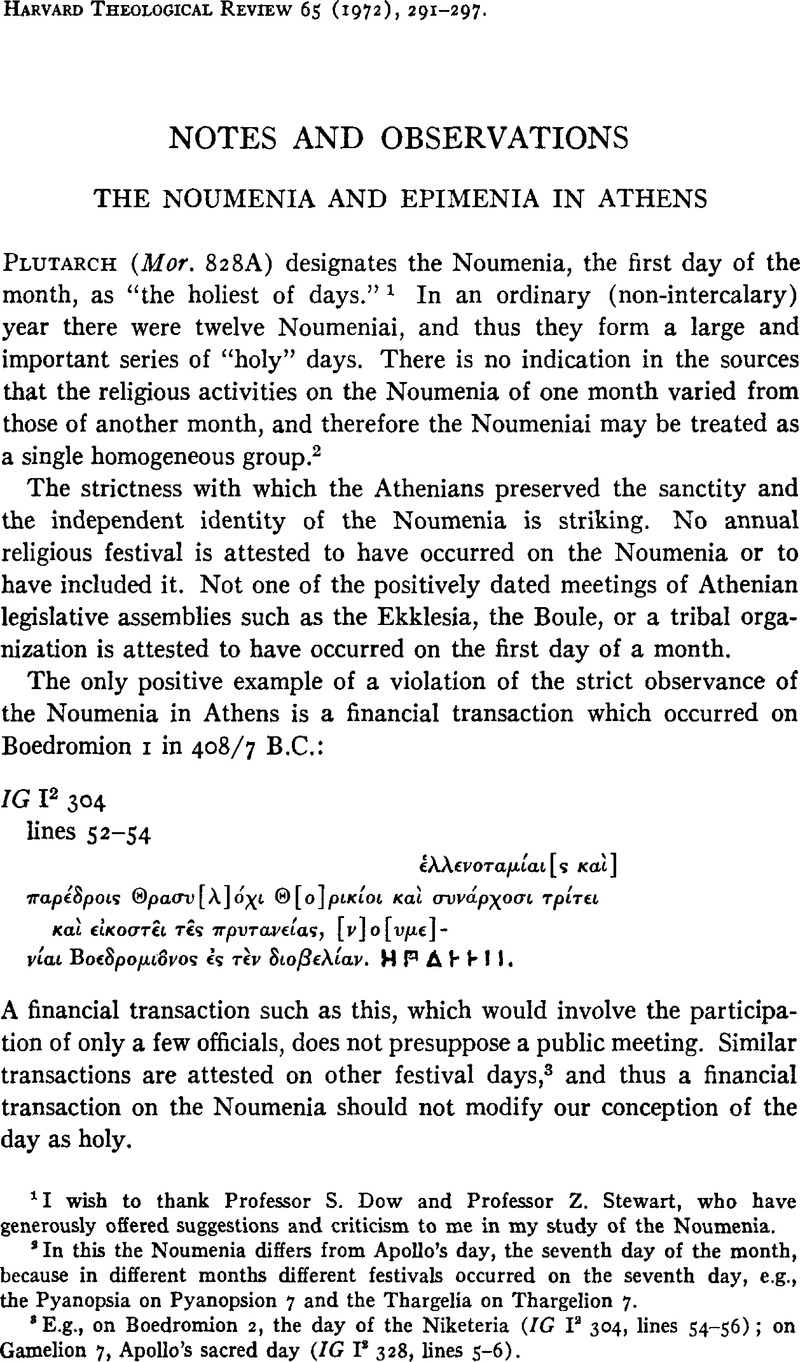Article contents
The Noumenia and Epimenia in Athens
Published online by Cambridge University Press: 10 June 2011
Abstract

- Type
- Notes and Observations
- Information
- Copyright
- Copyright © President and Fellows of Harvard College 1972
References
1 I wish to thank Professor S. Dow and Professor Z. Stewart, who have generously offered suggestions and criticism to me in my study of the Noumenia.
2 In this the Noumenia differs from Apollo's day, the seventh day of the month, because in different months different festivals occurred on the seventh day, e.g., the Pyanopsia on Pyanopsion 7 and the Thargelia on Thargelion 7.
3 E.g., on Boedromion 2, the day of the Niketeria (IG I2 304, lines 54–56); on Gamelion 7, Apollo's sacred day (IG I2 328, lines 5–6).
4 Nilsson, M. P., Die Entstehung und religiöse Bedeutung des griechischen Kalendars2 (1962), 40–42Google Scholar; and Noumenia, , RE 17 (1937), 1292–94Google Scholar.
5 Ziehen, L., Noumenia, RE 17 (1937), 1294–95Google Scholar.
6 Also Alkiphron III, 61, 2 and III, 38, 1; Lukian, Merc. Cond. 23.
7 Aristophanes Nub. 1131–1141.
8 For the nature of this “banqueting fraternity,” see Caliioun, G. M., Athenian Clubs in Politics and Litigation, 32–33.Google Scholar
9 Etym. Magn. 131.13.
10 For the involvement of numerous deities at Athens note plural ἀγάλμασιν in schol. to Aristophanes Vesp. 94. Also plural θɛοῖς in Demosthenes 25.99, t o be discussed infra.
11 For a similar cleaning and adorning of a statue on the Noumenia at Erythrai, see SIG 3 284.
12 Ziehen, , Noumenia, RE 17, 1295.Google Scholar
13 Nilsson, , Noumenia, RE 17, 1293.Google Scholar
14 ἔξω τῶν ἑορτῶν ἱεραί τινες τοῦ μηνòς ἡμέραι νομίςονται Ἀθἡνησιν θεοῖς τισίν, οἷον νουμηνία καὶ ἑβδóμη Ἀπóλλωνι.
15 A possible objection might be that ἐπιμήνιος is merely a common adjective meaning “monthly,” and that therefore the coincidence in Herodotus and Hesychios is not significant. In Athenian sources, however, ἐπιμήνιος is rarely attested. Further, as was pointed out to me by Professor Z. Stewart, the wording of Herodotus 8.41 suggests that a technical term (i.e., ἐπιμήνια) is being defined.
16 Theophrastus Char. 4.12: καὶ (ὁ ἄγροικος) ɛἰς ἄστυ καταβαίνων ἐρωτῆσαι τὸν ἀπαντῶντα…ɛἰ σήμɛρον ὁ ἅρχων νουμηνίαν ἄγɛι
17 Athenaios 6.234 E: τὰ δὲ ἐπιμήνια θυέτω ὸ ἱɛρɛύς.
- 1
- Cited by


